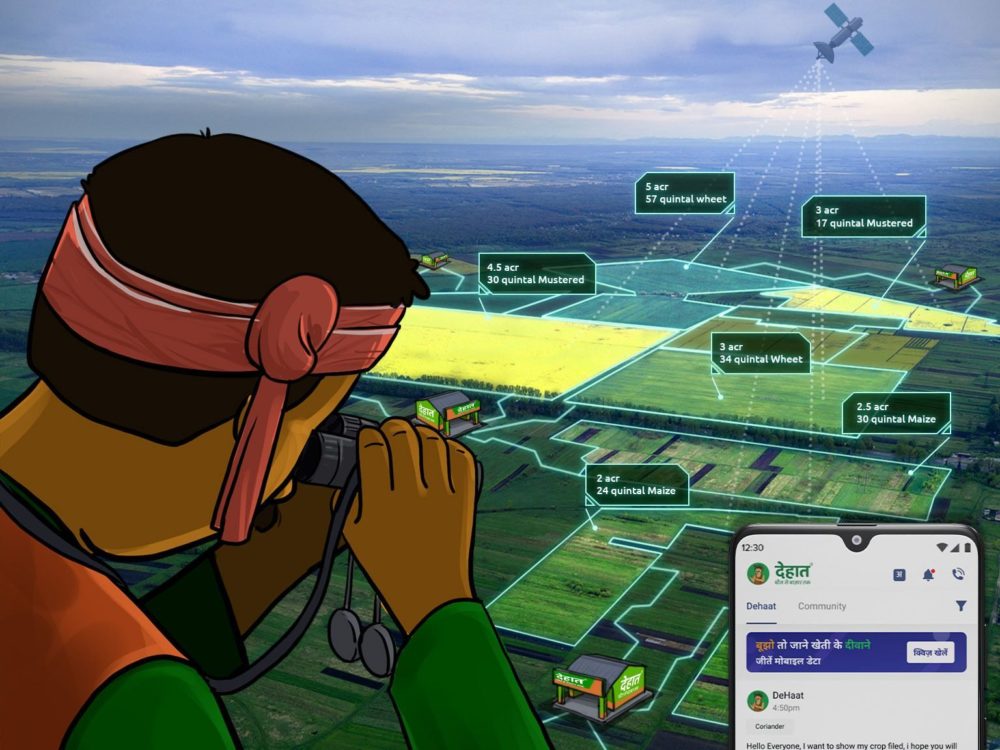DeHaat, an Indian agtech platform serving smallholder farmers, has acquired spatial imagery and data science startup Farm Guide to further bolster its marketplace and advisory services. [Disclosure: DeHaat is an AgFunder portfolio company; AgFunder is the parent company of AFN.]
With this aqui-hire, the company, which serves over 380,000 farmers across India, handles 10,000 input orders a day and aggregates and delivers 650 metric tons of produce a day, will now also add financial services for farmers on the platform.
On the advisory front, DeHaat can now combine its existing transactional database with trained satellite imagery data to better make recommendations for seeds and fertilizers and predict crop, water, and nutrient stress.
Satellite imagery has generally been useful for farmers with farms of a big enough size to be identified from space. Spatial data about smallholder farms has typically been left to be used in aggregate by large corporations or governments, to detect trends and climate impacts. But Farm Guide has managed to train its algorithms to recognize individual land parcels as small as half an acre (0.2 hectares) with 75%-80% accuracy.
This is great news for India, where the average farm is one hectare in size and over 78% of farmers are smallholders, contributing 40% of the country’s grain and owning 33% of its land, according to the UN’s Food & Agriculture Organization. Importantly, it’s also relevant for the vast majority of Africa’s farmers, which means this deal puts DeHaat on a course for international expansion. Prosus Ventures, part of South African tech giant Naspers, led the Indian startup’s $30 million Series C round last month.
CEO Shashank Kumar claims DeHaat is the only company worldwide that’s able to do this.
“Our platform is now in a position to detect farm boundaries anywhere in the world; this is something no one across the globe has cracked before,” he says. “We are open to collaborate with anyone that wants to license this technology in other parts of the world for smallholder farmers.”
The ability to identify individual land holdings also opens up the DeHaat platform to financial services providers; previously, less than 12% of India’s farmers had access to loans and other financial products because they were unable to provide banks with sufficient data about their businesses. This is not unique to India, but an issue for smallholders all over the world; and it has resulted in several African agtech startups adding financing to their offerings to enable farmers to afford their products.
Ag marketplace DeHaat banks $30m in Naspers-led Series C round – read more here
“We are planning on rating farmers and their different farms so those ratings can be accessible for different financial institutions,” Kumar says. “That means, because of our existing data stack and last-mile network, we’ve now not only bridged the gap between farmers and input companies and offtake buyers, but we’re also in a position to bridge the gap for financial services as well.”
Farm Guide, which was founded in 2016 and had raised $2 million in funding, trained its platform based on 10 years of satellite imagery data and millions of physical data points. The Indian government used it to deploy various crop insurance programs across seven states and a few agri input companies, but then struggled to connect to the last mile — the farmers themselves — and monetize. That’s where DeHaat comes in.
Roll-up acquisitions are slowly becoming a more common sight in the agtech industry as companies with distinct technologies join forces to offer farmers and the supply chain more complete products and services that are more usable and impactful for their target customers.





